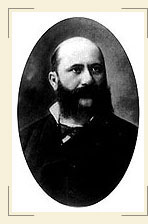|
Ioannis Fokianos
Ioannis Fokianos is one of the pioneers of Greek sport, seeing that he was one of the first Greek gymnasts, writer of sports books and an important  official of Greek sport from the 1870s and until the end of the century. official of Greek sport from the 1870s and until the end of the century.
He was born in Athens in 1845 and in the 1860s he studied in the Physics and Mathematics faculty of the University of Athens. At the same time he was a student of Georgios Pagon and Jules Ening in the Public (Dimosio) Gymnasium, then he became their assistant and, after 1968, he succeeded them in the management of the Gymnasium. From this position he contributed to the creation of the first sports nuclei in the Greek capital and to the diffusion of gymnastics after the German model, which he had adopted. In 1875 he assisted the organization of the third Olympia and was held responsible for the organizational failure of the games. He then resigned from his post in the Gymnasium and went to Thessaloniki, where he was appointed gymnast in the schools of the city's Greek community that had been founded with the help of the Syllogos pros Diadosin ton Ellinikon Grammaton (Society for the Dissemination of Greek Letters).
In 1879 Fokianos returned to Athens. His return was associated with the initial processes for the formation of the Greek sports institutions. In 1878 the construction of the Central Gymnasium was completed and the following year Fokianos was appointed manager. In 1879 was held in Athens the first Congress of Greek Associations, namely the first congress of educational associations that were active inside and outside the boundaries of the Greek State. During that meeting was discussed the issue of the introduction of gymnastics in education. Indeed, in 1880 gymnastics became a compulsory discipline in public education, whereas from 1882 the first state school for gymnasts became operative (albeit occasionally). The same year was founded the Athenian Gymnastic Association, whereas in 1883 the first apparatus (e.g. dumbbells) were introduced in the gymnasiums. At that same time, namely the early 1880s, Fokianos was appointed supervisor of the state gymnasiums (1882) and published the Manual of Gymnastics, one of the first books on gymnastics written in Greece.
As part of the above developments a small nucleus of athletes was created around Fokianos. They were people who frequented the Central Gymnasium, which several years later changed its name to "Fokiano Gymnasium" in honour of Fokianos. It was there that Fokianos prepared and fostered the fourth Zappeian Olympiad in 1889, the sports events of 1890 and the foundation of the Panhellenic Gymnastic Society, of which he was the first president (1891-1896). Fokianos died suddenly, only a few weeks after the closure of the first modern Olympic Games, in the organization of which he had been passed over by a new category in sport, the sports officials, like Konstantinos Manos.
As a gymnast and a sports advocate Fokianos had been a supporter of gymnastics. Therefore, it is not a coincidence that artistic gymnastics were introduced in the third and fourth Olympia, which were organized by Fokianos. What is more, he was one of the pioneers in the establishment of the German gymnastic system, which was opposed by younger gymnasts, such as Ioannis Chrysafis, who preferred the Swedish system. Another important difference between the two pioneer Greek gymnasts was the way they perceived sport. For Fokianos sport was before anything else a practice associated with the activities of educated people belonging to the middle and upper social strata, who would constitute the positive example for the diffusion of sport and its adoption by broader social strata. It is not a coincidence that students were the only ones who were entitled to participate in the third Olympia, whereas the overwhelming majority of the frequenters of the Central Gymnasium were also students.
On the contrary, Chrysafis maintained that the development of sport should concern everyone, without any economic, social or cultural barriers, and for that reason he directed his activity largely to extending the discipline of gymnastics to education and to creating a school of gymnasts. Nevertheless, both of them championed a model of development that differentiated from high-performance sport, namely championship sport. Their common characteristic was that in all the sports games organized by Fokianos and Chrysafis until 1896 the recording of performances had not been a concern whatsoever.
|